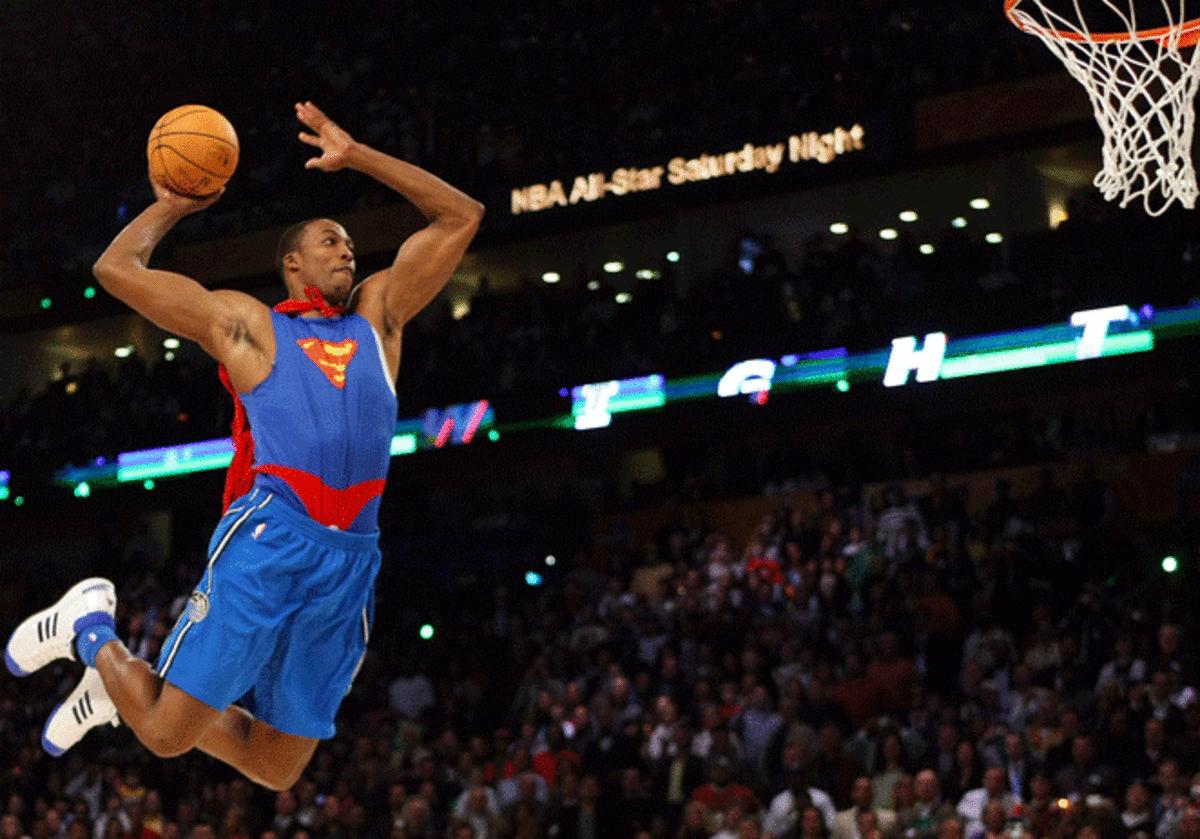
Have superheros replaced athletes as childhood idols of choice?

These days some kids are much more interested in Superman the character than athletes like Dwight Howard who claim to be heros.
/AFP/Getty Images
Superheroes have replaced athletes as the childhood idol of choice, at least to my son and his friends, for whom Superman, Batman, Spiderman and a 25-man roster of others mutants are what various football and baseball stars once were to me. And that's probably progress, for as long as it lasts. When my son's teacher asked him if he had any allergies, he sighed and said, "Just kryptonite."
All the stuff that I wanted as a kid with a Vikings or Reds logo on it -- bed sheets, backpacks, posters, lunchboxes, T-shirts, Thermoses -- he wants (or has) with a more heroic icon on it: The Flash's lightning bolt, say, or the Green Lantern's cryptic logo (like a lost letter from the Cyrillic alphabet). Where I wanted jerseys, he wants capes. He gazes into the DC Comics Encyclopedia as I once looked for meaning in The Baseball Encylopedia.
The only catch he wants me to play is enlisting my help to catch Lex Luthor, Two-Face, Brainiac, the Joker, Bizarro or any of two dozen other comic book criminals whose names and felonious CVs he has memorized in the same way that I once memorized the thumbnail biographies of ballplayers whose life stories -- in hindsight -- were no less fictitious, or hokily inspirational, than those of Clark Kent or Bruce Wayne.
Speaking of Bruce Wayne, Batman's alter-ego has the world's coolest car and a mansion and a butler and a loyal wingman and the best man cave ever devised, the very trappings that fans seem to envy about athletes -- including athletes themselves, so many of whom (from Shaquille O'Neal to Corey Hart to Mario Williams) have also expressed a desire to be Superman or Batman.
And yes, my son wants -- and fully expects -- to grow up to be a superhero, just as I wanted to be a major league baseball player. He believes superheroes to be real, blowing off the buzzkill deniers, namely his older sisters. He thinks the soft skin between his fingers is a nascent web that foretells a possible future as Aqua Man. A grass stain on his pants portends a transformation into The Hulk.
In the very same way, I took a childhood resemblance to the fully-grown George Foreman -- pointed out by a kid up the street and affirmed by six others on banana-seated bicycles -- as foretelling my future as a heavyweight champion.
My son is hardly unique in choosing superheroes over Super Bowl champions. In the culture at large, superheroes are more ubiquitous than athletes, and more commercial than ever, their likenesses appearing on everything from underwear to Fatheads to the tin signs sold by street vendors in Manhattan. Parents have to run a sleeve-tugging gauntlet of Batman and Superman ephemera just to get through the checkout snakeline at Old Navy.
Sneaker commercials on Saturday morning TV used to stoke dreams of athletic excellence -- street-hockey prowess, driveway hoop greatness, backyard football glory -- if only your mom would buy you PF Flyers: "Run faster, jump higher!"
The sneakers my son wants are "Mega-Flex, from Skechers," whose commercial tagline goes: "Because superheroes need super shoes!"
These commercials air during various versions of animated Batman, Superman and Spiderman programs -- to say nothing of the manifold Transformers iterations -- on the Hub, a cable channel that is to superheroes as ESPN is to sports heroes. Will my son eventually transition from the former channel to the latter? And do I want him to?
Not anytime soon. He's invented several superheroes of his own, my favorite being "Gordon Gunn, Good Guy," which sounds like someone Wayne LaPierre might have conjured in a fever dream but is in fact a gallant, gunless, kung fu fighter for truth, justice and bottomless snacks.
But then these guys are always Good Guys -- super and heroic as their job description suggests. They're exactly what I thought all my sports heroes were, when I was my son's age.
His idols will never get busted for anything, despite their tendency, over the years, to more unnatural physiques. Christopher Reeve looked huge in Superman in 1978, but his comic book incarnations have had to muscle-up to compete with latter-day rivals in baseball, the NFL and NBA. Superman circa 1978 now looks like Mark McGwire circa 1984.
That's fine, because Superman will never sit down with Oprah. The World Anti-Doping Agency is not investigating the Hulk. The Green Lantern's ring-- emblem and source of all his power -- will not likely end up on Pawn Stars.
And if my son someday has to learn that his heroes never really existed, I can tell him: "Welcome to the club."




